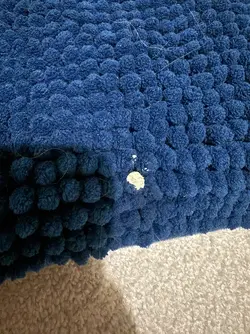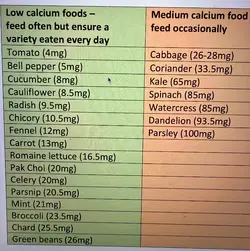I agree with the things everyone has said.
Three times a week for tomato is still far too much. Tomatoes shouldn’t be in the diet and if they are then they shouldn’t fed any more than one small amount and no more once a week.
The acidity in them can lead to an infection called cheilitis which can be fatal.
I have to say, I thought chicory was a slightly higher calcium item and wasn’t an every day suitable food. It’s not something I ever feed so I can’t quite recall.
No pellet will prevent sludge.
However, piggie parcels is the one I would recommend for its urinary support.
The key is keeping pellets limited though.
How many pellets are you feeding per day?
One tablespoon per day is the maximum.
Do you filter their drinking water?
Water and pellets are the main two areas their calcium comes into the diet.
The four safe and bladder safe daily veg are lettuce, a small amount of coriander, bell pepper and cucumber. These can be fed even to a pig with bladder issues.
Do note though that a diet which is too low in calcium is just as bad as one which is too high - the balance is still wrong, it’s just wrong the other direction. Too low will still cause bladder related problems so you can’t and shouldn’t cut out too much. Instead you have to find a balance which is right for your area, and it’s going to be an individual thing.
For example - my piggies have constant hay. They have one cup of veg per day - lettuce, bell pepper, coriander. They also get grass.
Their drinking water is filtered.
I do not feed pellets every day. Instead they get five pellets each on a Wednesday and five pellets each on a Sunday and that’s it. I give a small amount of dried forage on some of the other days instead.
Now, because they hardly have any pellets I have leeway in other aspects of their diet so I do feed some higher calcium veggies such as kale, spinach or spring greens (never at the same time) in the week as a variety. We have found a sweet spot which works for us.
This is our pees and stones guide And our diet guide. This will help you with information on bladder related issues
1 The Urinary Tract
2 Pees
- Water intake changes
- Pee discoloration
3 Infections
- Bacterial urine infection (UTI)
- Bacterial cystitis
- Sterile cystitis (interstitial cystitis or IC)
4 Stones, Sludge and Crystals
- Crystals, stones and sludge
- Stone and sludge removal
5 Kidneys...
1 The recommended ratio of food groups
2 Hay and fresh grass
3 Vegetables, fresh herbs and fruit with an illustrated balanced sample diet
4 Special dietary needs
- Urinary tract infections, bladder stones and sterile IC (non-bacterial interstitial cystitis)
- Diabetes and long term digestive problems
- Impaction in boars
- Pregnancy and nursing dietary tweaks (only visible to registered members who have accepted our no intentional breeding policy)...
 I really don’t know what I can change now
I really don’t know what I can change now
